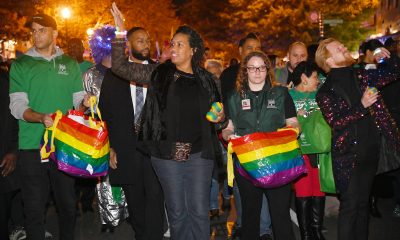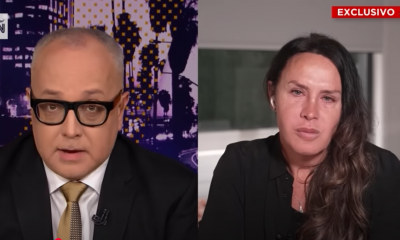National
Activists reflect on Black Trans Lives Matter movement resurgence
Blade speaks with Alex Santiago, Jasmyne Cannick
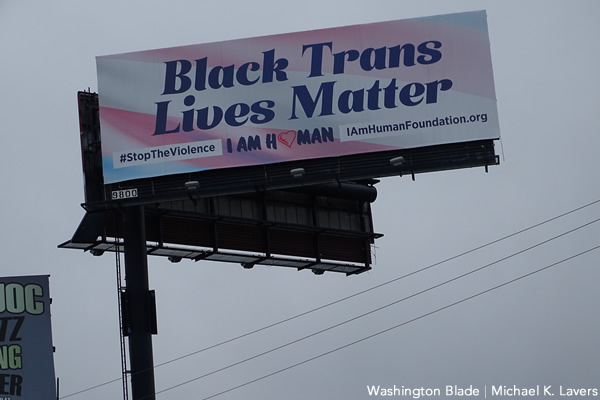
The world came to a standstill last year as a video surfaced online that showed then-Minneapolis police officer Derek Chauvin murdering George Floyd. The video went viral and sparked numerous protests against racism and police brutality in the U.S. and around the world as many people felt it a potent time to relay their frustrations with and to their governments.
For the LGBTQ community, these protests brought to light the need for human rights for transgender individuals as the murders of people like Tony McDade in Florida and Nina Pop in Missouri reawakened the flame within the Black Trans Lives Matter movement.
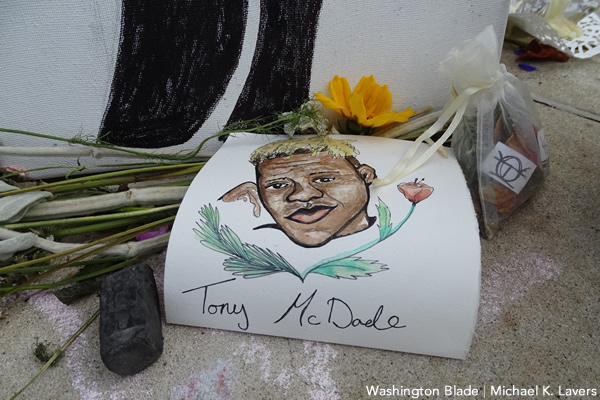
The Washington Blade more than a year later spoke with Alex Santiago, executive director of the I Am Human Foundation in Atlanta, and Jasmyne Cannick, a Democratic political strategist and journalist in Los Angeles, to reflect on last year’s Black Trans Lives Matter movement, how far it has come, and what’s in store for the future.
Uplifting voices often silenced
Participating in the Black Lives Matter protests was an easy decision for Santiago. He is a member of the Legendary House of Garcon, a ballroom house headquartered in D.C.
Although the house is composed mostly of LGBTQ members, Santiago still felt the need to center trans voices and experiences by visually representing them during Black Lives Matter marches.
“[I decided that] when I go I’m going to have signs that say ‘Black Trans Lives Matter.’ After talking to a couple of the people in the house, they said it was a great idea. So, they got these t-shirts made that incorporated the trans colors [baby blue, baby pink and white],” says Santiago.
Out of the 250 people in the Legendary House of Garcon, 175 showed up to D.C. from other states to march in solidarity with Black trans people. Santiago says that from what he was told, his was the largest group of activists representing Black trans lives at protests.
“At first I thought people were going to look at us crazy, like, ‘Why are you separating yourselves or being exclusive?’. But, we got a great response from the general population that was there that day. It was a good day,” says Santiago.
Cannick, who was in Los Angeles during the protests, lent her efforts to platforming pertinent issues. She identifies herself as an ally and a “friend” to the LGBTQ community.
“I’m active in the LA community and everybody knows me. So, whenever something happens, someone is hurt, someone is killed or someone needs to get the word out about something that’s going on particularly as it relates to the trans community, I’m always asked to get involved, and I do,” says Cannick.
Over the past year, she reported on multiple LGBTQ issues including the trial of Ed Buck, a Democratic political fundraiser who was convicted in the deaths of two gay Black men who he injected with methamphetamine in exchange for sex.
What happened to the BTLM movement and what needs to change?
The nature of many social movements is that as the intense emotion surrounding them fades, people’s fervor for change wanes as well. This is especially true with allies who are not directly linked to the cause.
“Fatigue and frustration at the relatively slow pace of change to a growing backlash on the right against efforts to call out systemic racism and white privilege — has led to a decline in white support for the Black Lives Matter movement since last spring, when white support for social justice was at its peak,” US News reports about the Black Lives Matter movement.
Cannick believes this is the same for the Black Trans Lives Matter movement. She says Americans allow the media to dictate how it behaves and responds to issues. Thus, when stories “fall out of our media cycles … they fall out of our memories.”
“I think that’s not going to change, and that’s a psychological thing, until we learn how to not let the media necessarily dictate our issues,” says Cannick.
She suggests that individuals remain plugged into their communities by “doing anything to make sure they keep up with an issue” including following the “right people” on social media and setting up Google alerts for any breaking news.
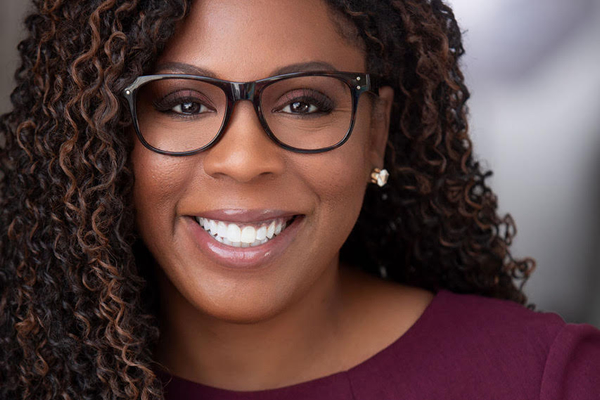
Santiago also echoes Cannick’s sentiments.
“We wait until something happens before we do something. And, I don’t want to be retroactive; I want to be proactive. I want people to see me when things are going well [and when they’re not going well],” says Santiago.
Upon returning to his home in Atlanta after the D.C. protests, Santiago contacted a billboard installation company and paid for a billboard labelled, “Black Trans Lives Matter” to be displayed on University Avenue near downtown Atlanta. He says that the billboards got attention and helped to spread much-needed awareness. Following this success, he is now in the process of installing a new billboard labelled, “Black, Trans and Visible. My life Matters.”
“Unless you’re in people’s faces or something drastic happens, people forget. Unless you’re living it, people forget,” says Santiago.
As time progresses, both Santiago and Cannick nest hope for the Black Trans Lives Matter movement. However, this hope can only persist when crucial steps are taken to ensure Black trans individuals around the country are protected, most importantly through legislation.
The New York Times reports there are close to 1,000 elected LGBTQ officials in the U.S., with at least one in each state except Mississippi.
“We need to have more legislation. We need more voices in power like the council Biden has right now,” says Santiago.
“You know that [Biden] has a lot of trans people and Black trans people [involved], and a part of that’s a positive step in the right direction, but we need that times 10,” says Santiago.
He believes that political representation should extend to local governance where ordinary Black trans individuals can be trained to assume leadership roles.
Cannick’s focus is on the Black community.
“[Trans women] are usually murdered by Black men. If we ever expect that to change, we need to start talking about that,” says Cannick.
She’s open to having conversations that put people, including her as a cis-identifying woman, in uncomfortable and awkward spaces.
She hosts a podcast titled “Str8 No Chaser” and recently aired an episode, “Why Are Black Men Killing Trans Women,” where she discussed with three Black trans women about the gender and sexuality dynamics within the Black community and their perils.
U.S. Federal Courts
Federal judge blocks Trump passport executive order
State Department can no longer issue travel documents with ‘X’ gender markers

A federal judge on Friday ruled in favor of a group of transgender and nonbinary people who have filed a lawsuit against President Donald Trump’s executive order that bans the State Department from issuing passports with “X” gender markers.
The Associated Press notes U.S. District Judge Julia Kobick in Boston issued a preliminary injunction against the directive. The American Civil Liberties Union, which represents the plaintiffs, in a press release notes Kobick concluded Trump’s executive order “is likely unconstitutional and in violation of the law.”
“The preliminary injunction requires the State Department to allow six transgender and nonbinary people to obtain passports with sex designations consistent with their gender identity while the lawsuit proceeds,” notes the ACLU. “Though today’s court order applies only to six of the plaintiffs in the case, the plaintiffs plan to quickly file a motion asking the court to certify a class of people affected by the State Department policy and to extend the preliminary injunction to that entire class.”
Former Secretary of State Antony Blinken in June 2021 announced the State Department would begin to issue gender-neutral passports and documents for American citizens who were born overseas.
Dana Zzyym, an intersex U.S. Navy veteran who identifies as nonbinary, in 2015 filed a federal lawsuit against the State Department after it denied their application for a passport with an “X” gender marker. Zzyym in October 2021 received the first gender-neutral American passport.
The State Department policy took effect on April 11, 2022. Trump signed his executive order shortly after he took office in January.
Germany, Denmark, Finland, and the Netherlands are among the countries that have issued travel advisories for trans and nonbinary people who plan to visit the U.S.
“This ruling affirms the inherent dignity of our clients, acknowledging the immediate and profound negative impact that the Trump administration’s passport policy would have on their ability to travel for work, school, and family,” said ACLU of Massachusetts Legal Director Jessie Rossman after Kobick issued her ruling.
“By forcing people to carry documents that directly contradict their identities, the Trump administration is attacking the very foundations of our right to privacy and the freedom to be ourselves,” added Rossman. “We will continue to fight to rescind this unlawful policy for everyone so that no one is placed in this untenable and unsafe position.”
State Department
HIV/AIDS activists protest at State Department, demand full PEPFAR funding restoration
Black coffins placed in front of Harry S. Truman Building

Dozens of HIV/AIDS activists on Thursday gathered in front of the State Department and demanded the Trump-Vance administration fully restore President’s Emergency Plan for AIDS Relief funding.
Housing Works CEO Charles King, Health GAP Executive Director Asia Russell, Human Rights Campaign Senior Public Policy Advocate Matthew Rose, and others placed 206 black Styrofoam coffins in front of the State Department before the protest began.
King said more than an estimated 100,000 people with HIV/AIDS will die this year if PEPFAR funding is not fully restored.
“If we continue to not provide the PEPFAR funding to people living in low-income countries who are living with HIV or at risk, we are going to see millions and millions of deaths as well as millions of new infections,” added King.
Then-President George W. Bush in 2003 signed legislation that created PEPFAR.
The Trump-Vance administration in January froze nearly all U.S. foreign aid spending for at least 90 days. Secretary of State Marco Rubio later issued a waiver that allows the President’s Emergency Plan for AIDS relief and other “life-saving humanitarian assistance” programs to continue to operate during the freeze.
The Washington Blade has previously reported PEPFAR-funded programs in Kenya and other African countries have been forced to suspend services and even shut down because of a lack of U.S. funding. Two South African organizations — OUT LGBT Well-being and Access Chapter 2 — that received PEPFAR funding through the U.S. Agency for International Development and the Centers for Disease Control and Prevention in recent weeks closed down HIV-prevention programs and other services to men who have sex with men.
Rubio last month said 83 percent of USAID contracts have been cancelled. He noted the State Department will administer those that remain in place “more effectively.”
“PEPFAR represents the best of us, the dignity of our country, of our people, of our shared humanity,” said Rose.
Russell described Rubio as “ignorant and incompetent” and said “he should be fired.”
“What secretary of state in 90 days could dismantle what the brilliance of AIDS activism created side-by-side with George W. Bush? What kind of fool could do that? I’ll tell you who, the boss who sits in the Harry S. Truman Building, Marco Rubio,” said Russell.

U.S. Military/Pentagon
Pentagon urged to reverse Naval Academy book ban
Hundreds of titles discussing race, gender, and sexuality pulled from library shelves

Lambda Legal and the Legal Defense Fund issued a letter on Tuesday urging U.S. Defense Secretary Pete Hegseth to reverse course on a policy that led to the removal of 381 books from the Nimitz Library of the U.S. Naval Academy in Annapolis, Md.
Pursuant to President Donald Trump’s executive order 14190, “Ending Radical Indoctrination in K-12 Schooling,” the institution screened 900 titles to identify works promoting “diversity, equity, and inclusion,” removing those that concerned or touched upon “topics pertaining to the experiences of people of color, especially Black people, and/or LGBTQ people,” according to a press release from the civil rights organizations.
These included “I Know Why the Caged Bird Sings” by Maya Angelou, “Stone Fruit” by Lee Lai, “The Hate U Give” by Angie Thomas, “Lies My Teacher Told Me: Everything Your American History Textbook Got Wrong” by James W. Loewen, “Gender Queer: A Memoir” by Maia Kobabe, and “Democracy in Black: How Race Still Enslaves the American Soul” by Eddie S. Glaude, Jr.
The groups further noted that “the collection retained other books with messages and themes that privilege certain races and religions over others, including ‘The Clansman: A Historical Romance of the Ku Klux Klan’ by Thomas Dixon, Jr., ‘Mein Kampf’ by Adolf Hitler, and ‘Heart of Darkness’ by Joseph Conrad.
In their letter, Lambda Legal and LDF argued the books must be returned to circulation to preserve the “constitutional rights” of cadets at the institution, warning of the “danger” that comes with “censoring materials based on viewpoints disfavored by the current administration.”
“Such censorship is especially dangerous in an educational setting, where critical inquiry, intellectual diversity, and exposure to a wide array of perspectives are necessary to educate future citizen-leaders,” Lambda Legal Chief Legal Officer Jennifer C. Pizer and LDF Director of Strategic Initiatives Jin Hee Lee said in the press release.
-

 El Salvador3 days ago
El Salvador3 days agoGay Venezuelan makeup artist remains in El Salvador mega prison
-

 District of Columbia5 days ago
District of Columbia5 days agoReenactment of 1965 gay rights protest at White House set for April 17
-

 State Department2 days ago
State Department2 days agoHIV/AIDS activists protest at State Department, demand full PEPFAR funding restoration
-

 Opinions4 days ago
Opinions4 days agoScience must not be a weapon against trans people

